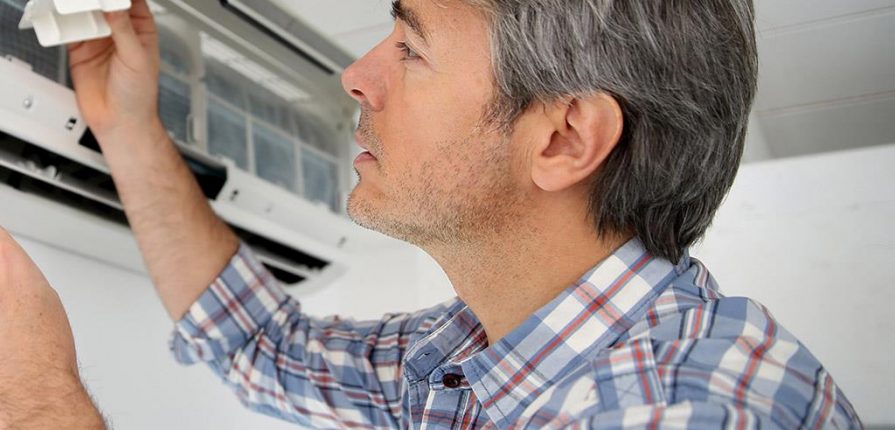Like all appliances, your heat pump may sometimes have trouble working correctly. Maybe it won’t turn on, or it no longer heats up appropriately. Alternatively, maybe your heat pump doesn’t cool down after use, or it runs constantly. With that in mind, below are some of the most common heat pump problems, as well as possible explanations and fixes for these issues.
Read over these common issues to see what you can do to get your heat pump running smoothly. However, if you need help, remember that it’s always a good idea to contact a local heat pump professional for service and maintenance assistance if needed.
THE 4 MOST COMMON HEAT PUMP PROBLEMS
Heat pump not turning on
If your heat pump won’t turn on at all, it’s likely caused by one of four major problems:
- Thermostat problems: First of all, check to see if your programmable thermostat is set to have the heat come on at the right time. If everything seems correct, the problem might be a miscalibration that’s causing your thermostat to read the temperature incorrectly or an electrical problem that’s stopping the thermostat from communicating with the heat pump. In either case, you’ll need to have the thermostat serviced by a professional.
- Power loss: Sometimes, a tripped breaker is the root source of the issue. Check to make sure your breakers are all in the correct position. However, if this happens on an ongoing basis, it’s likely a sign of an electrical failure with the heat pump, which you should have professionally serviced.
- Broken starter capacitor: Take a moment to listen to your heat pump. If you can hear a faint clicking noise that occurs as the heat pump is supposed to be turning on, your problem is likely with the starter capacitor. This component is responsible for transmitting the electrical charge that turns on the motors. You’ll need to bring a technician out to replace it.
- Broken reversing valve: As the name suggests, the reversing valve allows the heat pump to work as both a heater and an air conditioner by reversing the direction of the refrigerant. If the heat pump turns on when you want cool air, but not for heat, this is likely the cause. It will also need to be replaced by a technician.
Heat pump not heating
If your heat pump is not blowing hot air, there are typically three main causes:
- Unit is blocked: Your heat pump pulls heat from the air outside into your home. If the airflow to your unit is blocked by snow, ice, leaves or another type of debris, this can make it hard for the heat pump to do its job. Luckily, the solution is simple. Clean off your heat pump and clear away any debris that may be blocking the way.
- Air filter is dirty: Air filters are put in place to catch dirt and debris, but when too much builds up, it can block airflow to the compressor, the part of the unit that actually heats the air. This solution is simple, too. Check your filter and change it out for a new one if it’s dirty.
- Refrigerant charge is low: If your refrigerant levels are too low, likely from a leak, your heat pump will struggle to bring enough heat indoors to heat your home. Have a professional come out to check if the levels are too low or your system needs to be recharged.
Heat pump not cooling
If your heat pump is not cooling, it may be one of a few problems, most of which are similar to those listed above.
- Thermostat problems: First check to see that your thermostat is set to cool. If it is, there may be a problem with the thermostat that’s causing it to read the temperature incorrectly or an electrical problem that’s stopping the thermostat from communicating with the heat pump. In either case, you’ll need to bring in a professional.
- Broken reversing valve: If your heat pump is running, but the air coming out of your vents is hot, it’s likely a problem with your reversing valve. Again, this is the part of the heat pump that reverses the refrigerant and allows it to act as both a heater and an air conditioner. If this component is broken, it will need to be replaced by a technician.
- The components are dirty: If the air coming out of your vents is lukewarm, that’s a good sign that your components are dirty. Go outside and clean off the heat pump so it’s free of any debris and check the air filter to see if it needs to be changed.
- Refrigerant charge is low: Again, if your refrigerant levels are too low or if there is a leak, your heat pump will struggle to cool your home. Have a technician come out to check your levels and fix any leaks.
Heat pump running constantly
If your heat pump is constantly running, there are likely three main causes:
- Unusually cold weather: Heat pumps are designed to work much more gradually than a furnace. It’s possible that, if the weather is especially cold, your heat pump could run near-constantly without there being an issue.
- Thermostat problems: Again, check to make sure your thermostat is set correctly. If it is, it could be a miscalibration issue that’s causing the thermostat to read the temperature incorrectly or a wiring issue that signals an electrical problem. In either case, you’ll want to call in a professional to fix the issue.
- Broken compressor contractor: The compressor contactor controls how much power goes to your heat pump. If that’s damaged, it’s possible your heat pump could run all the time. You’ll need a professional to replace the part.
Frequently asked questions
What problems should you expect with a heat pump that’s been left unused?
A heat pump that’s left unused could experience any of the problems listed above, but it’s particularly susceptible to problems caused by debris and refrigerant leaks.
What problems affect a heat pump’s air handler?
If your system’s fan is running, but only cold air is coming out, it may be a problem with your air handler. If you’re hearing rattling noises from your system, it may also be the air handler.
How do I diagnose heat pump problems?
You can diagnose problems using some of the DIY fixes above, or by comparing heat pump reviews for your specific model. The best way to diagnose and treat any problems is to call in a local heat pump professional.



